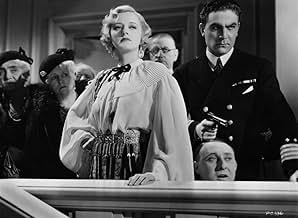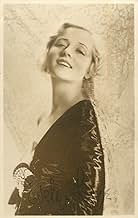Evelyn Laye(1900-1996)
- Actress
- Soundtrack
London-born Evelyn Laye, daughter of actor parents, was already
treading the boards at the age of two. Her father managed the Palace
Theatre in Brighton and this was where Evelyn first made a name for
herself. A seasoned stage performer by the age of fifteen, she
graduated to the London West End three years later in a small part in
"The Beauty Spot". During the 1920's, she was one of England's most
popular stars of musical revue and operetta, with hits in the aviation
musical "Going Up" (1918-19), "Madame Pompadour" (1923), "Betty in
Mayfair" (1925-26) and "Merely Molly" (1926-27), the last two at the
Adelphi Theatre. She appeared, both in London and on Broadway, in
Noël Coward's "Bitter Sweet" in 1929, her
song "I'll See you Again" becoming her trademark signature piece. Her
performance attracted the attention of producer
Samuel Goldwyn, who promptly brought her
to Hollywood.
Tagged (by Goldwyn) as "the Champagne Blonde", the lovely Evelyn made her American debut in the operetta, One Heavenly Night (1930), directed by the experienced George Fitzmaurice. The ridiculously contrived story and silly dialogue made this one of the worst flops of 1931, not helped by the wooden performance of Laye's co-star, John Boles. Although New York Times critic Mordaunt Hall, in his January 10 review reserved sole praise for Laye's singing and performance, Goldwyn washed his hands of the whole affair and Evelyn returned to England. She made another attempt at Hollywood, four years later, in The Night Is Young (1935), another continental operetta, co-starring Ramon Novarro, and featuring songs by Sigmund Romberg and Oscar Hammerstein. Reviewer Andre Sennwald (January 14) caustically described the picture as being technically well-made, but otherwise "without any distinguishing virtue". There were considerably better reviews for Evelyn's two British-Gaumont productions, Waltz Time (1933) and, without doubt her best motion picture, Evensong (1934), the story of the rise and decline of an Irish diva.
There was a three-decade long hiatus until Evelyn's return to the screen (though she had appeared as herself with then-husband, and fellow actor, Frank Lawton, in the TV sitcom My Husband and I (1956)). She was also rather incongruously cast in the horror film, Theatre of Death (1967). Three years later, Evelyn gave a strong performance as the mother of Jean Simmons in Say Hello to Yesterday (1971), a romance set in swinging 60's London. For the most part, she continued to act on the stage, which had always been her favourite medium, performing in plays like "Three Waltzes", "The School for Scandal", "Wedding in Paris", "The Marquise" and "The Amorous Prawn". One of her last plays was Noël Coward's "Semi-Monde" (1987-88), at the Royalty Theatre in London, with fellow cast members Kenneth Branagh and Judi Dench. Retaining her popularity well into her nineties, Evelyn Laye made her farewell tour of Britain in 1992. She died three years later at the age of 95.
Tagged (by Goldwyn) as "the Champagne Blonde", the lovely Evelyn made her American debut in the operetta, One Heavenly Night (1930), directed by the experienced George Fitzmaurice. The ridiculously contrived story and silly dialogue made this one of the worst flops of 1931, not helped by the wooden performance of Laye's co-star, John Boles. Although New York Times critic Mordaunt Hall, in his January 10 review reserved sole praise for Laye's singing and performance, Goldwyn washed his hands of the whole affair and Evelyn returned to England. She made another attempt at Hollywood, four years later, in The Night Is Young (1935), another continental operetta, co-starring Ramon Novarro, and featuring songs by Sigmund Romberg and Oscar Hammerstein. Reviewer Andre Sennwald (January 14) caustically described the picture as being technically well-made, but otherwise "without any distinguishing virtue". There were considerably better reviews for Evelyn's two British-Gaumont productions, Waltz Time (1933) and, without doubt her best motion picture, Evensong (1934), the story of the rise and decline of an Irish diva.
There was a three-decade long hiatus until Evelyn's return to the screen (though she had appeared as herself with then-husband, and fellow actor, Frank Lawton, in the TV sitcom My Husband and I (1956)). She was also rather incongruously cast in the horror film, Theatre of Death (1967). Three years later, Evelyn gave a strong performance as the mother of Jean Simmons in Say Hello to Yesterday (1971), a romance set in swinging 60's London. For the most part, she continued to act on the stage, which had always been her favourite medium, performing in plays like "Three Waltzes", "The School for Scandal", "Wedding in Paris", "The Marquise" and "The Amorous Prawn". One of her last plays was Noël Coward's "Semi-Monde" (1987-88), at the Royalty Theatre in London, with fellow cast members Kenneth Branagh and Judi Dench. Retaining her popularity well into her nineties, Evelyn Laye made her farewell tour of Britain in 1992. She died three years later at the age of 95.




























